Taking care of your car doesn’t always require a trip to the mechanic. With some basic tools and know-how, we can handle many maintenance tasks ourselves, saving hundreds or even thousands of dollars annually. From changing oil to replacing air filters, DIY car maintenance empowers us to become more self-sufficient vehicle owners.
But, not all car issues should be tackled by amateurs. While we’re advocates for DIY approaches, certain complex repairs require professional expertise and specialized equipment. Understanding this boundary between DIY-friendly tasks and professional-only jobs is crucial for maintaining your vehicle’s performance and safety. In this guide, we’ll explore which maintenance tasks you can confidently handle at home and which ones are best left to the pros.
Understanding the Value of DIY Car Maintenance
DIY car maintenance offers important cost savings compared to professional services. Regular maintenance performed at home can extend your vehicle’s lifespan by preventing small issues from becoming major problems. Car owners who handle basic maintenance tasks themselves typically save $500-$800 annually on labor costs alone.
Performing your own maintenance also provides valuable knowledge about how your vehicle functions. This familiarity helps you identify potential problems earlier and communicate more effectively with mechanics when professional service is necessary. Many drivers report feeling more confident about their vehicles after mastering basic maintenance skills.
Time flexibility represents another key advantage of DIY maintenance. Instead of scheduling appointments and waiting at repair shops, you can perform maintenance when it’s convenient for you. Most basic maintenance tasks require only 30-60 minutes to complete, making them easy to fit into your schedule.
Beyond the practical benefits, many car enthusiasts find genuine satisfaction in caring for their vehicles. Learning to maintain your car creates a deeper connection with your investment and provides a sense of accomplishment. DIY maintenance communities online offer support and guidance for beginners, making it easier than ever to start handling basic car care yourself.
Essential Tools for DIY Car Maintenance
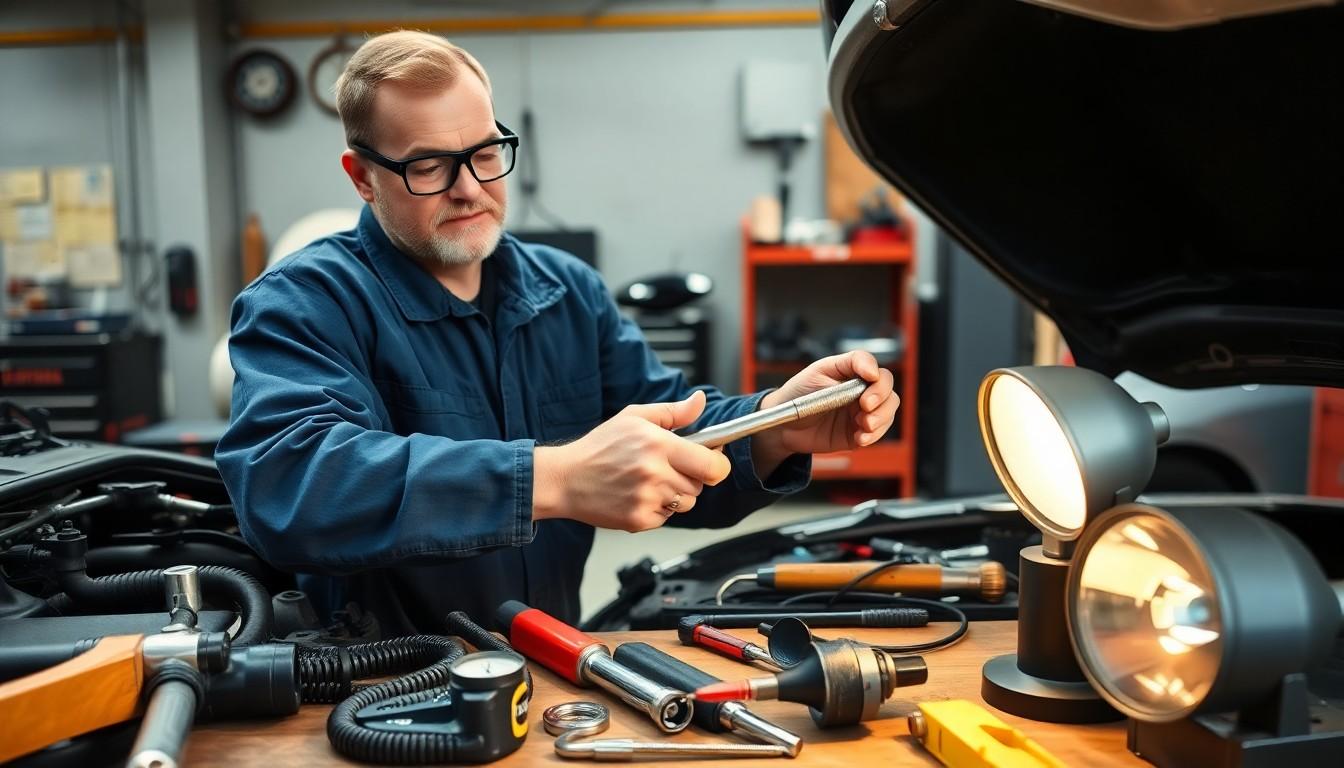
Equipping yourself with the right tools makes DIY car maintenance more efficient and effective. Having these essential items in your garage ensures you’re prepared to tackle common maintenance tasks without frustration.
Basic Tool Kit Essentials
A complete basic tool kit forms the foundation of DIY car maintenance. Socket sets in various sizes let you work with different bolts and nuts throughout your vehicle. Ratchets and extensions help reach bolts in tight or awkward spaces, making previously difficult tasks manageable. Adjustable and fixed wrenches, pliers, and screwdrivers handle a wide range of fasteners you’ll encounter during routine maintenance.
Tire pressure gauges are crucial for maintaining proper inflation, which affects fuel efficiency and tire wear. Oil dipsticks and funnels help checking and adding engine oil without spills. Work lights illuminate dark areas under the hood or vehicle, especially important during evening repairs. Jack and jack stands provide safe access to the underside of your car when changing tires or performing other underneath maintenance. Multimeters assist with basic electrical troubleshooting, helping identify issues with circuits, fuses, or batteries. Your vehicle’s owner’s manual contains exact information about maintenance intervals and procedures customized to your exact model.
Optional Tools for Advanced DIYers
Advanced DIY mechanics benefit from specialized tools that handle more complex maintenance tasks. Air compressors power pneumatic tools like impact wrenches, making stubborn bolt removal significantly easier. Impact wrenches apply concentrated torque to loosen seized fasteners that resist conventional tools. OBD-II scanners read trouble codes when your check engine light illuminates, helping diagnose problems before visiting a mechanic.
Specialized tools designed for exact jobs include timing belt tools, brake bleeding kits, and oil filter wrenches that simplify otherwise complicated procedures. Wiring diagrams and repair manuals from resources like ALLDATA DIY provide detailed instructions for complex repairs beyond what’s covered in the owner’s manual. These comprehensive guides show step-by-step procedures, wiring schematics, and torque specifications necessary for more involved maintenance projects. Investing in these advanced tools makes sense for enthusiasts who regularly perform maintenance beyond basic tasks and want to expand their DIY capabilities.
Maintenance Tasks Every Car Owner Can Do
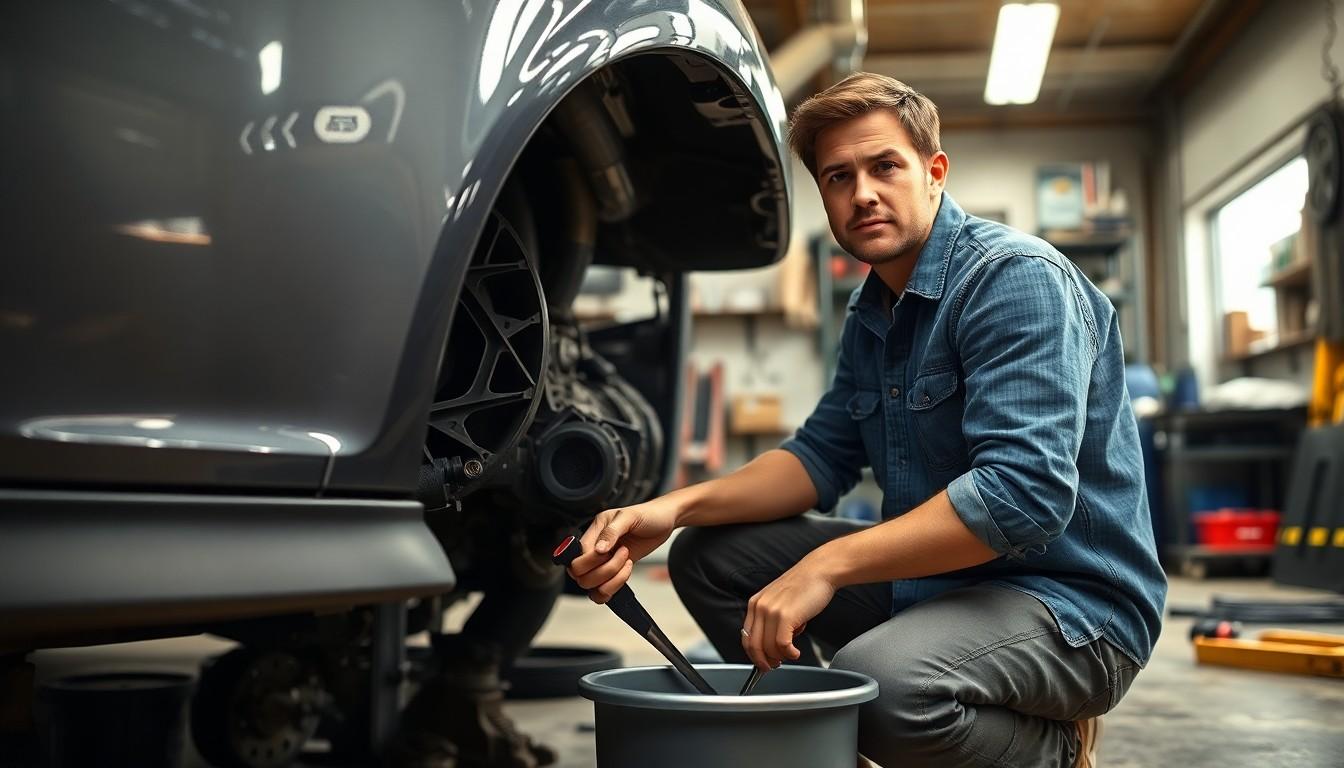
Regular car maintenance doesn’t always require a trip to the mechanic. Many routine tasks are simple enough for any car owner to perform with basic tools and a little guidance. These DIY maintenance jobs save money and help you become more familiar with your vehicle’s needs.
Changing Oil and Oil Filters
Changing your oil and oil filter is one of the most straightforward maintenance tasks you can perform at home. Start by ensuring your engine is completely cold before locating the oil drain plug at the bottom of the engine. Position an oil pan beneath the plug, remove it, and allow the old oil to drain completely. After replacing the drain plug, remove the old oil filter and install a new one, making sure to apply a thin layer of fresh oil to the gasket. Finally, add the recommended type and amount of oil as specified in your owner’s manual. This simple maintenance task typically saves $30-$70 compared to professional service.
Replacing Air Filters
Your car has two important air filters that need regular replacement: the engine air filter and the cabin air filter. The engine air filter is typically housed in a rectangular box in the engine compartment. Open this box, note the position of the old filter, remove it, and insert the new one in the same orientation. Cabin air filters, usually located behind the glove compartment or under the dashboard, require consulting your owner’s manual for exact location. Both filters are inexpensive ($10-$30) and take just minutes to replace, improving fuel efficiency and air quality inside your vehicle.
Changing Wiper Blades
Worn wiper blades reduce visibility during rain and can potentially scratch your windshield. Replacement takes just a few minutes per blade. Purchase the correct size and type for your vehicle, then lift the wiper arm away from the windshield. Look for a small tab or release mechanism on the wiper blade, press it, and slide the old blade off the arm. Slide the new blade onto the arm until it clicks securely into place. Lower the arm gently back to the windshield and repeat for the other side. Fresh wiper blades dramatically improve visibility during inclement weather and typically cost only $20-$40 for a pair.
Battery Maintenance and Replacement
Battery maintenance involves regular inspection for corrosion on terminals, which appears as a white, powdery substance. Clean corroded terminals using a wire brush and a mixture of baking soda and water. Check that battery connections are tight and the battery is securely mounted. For replacement, disconnect the negative (black) cable first, followed by the positive (red) cable to prevent short circuits. Remove any hold-down clamps, lift out the old battery, and install the new one. Reconnect in reverse order—positive cable first, then negative. Proper battery maintenance extends its life, while DIY replacement saves $25-$50 in labor costs.
Replacing Light Bulbs
Failed lights compromise safety and may result in traffic citations. Access methods vary by vehicle model, but typically involve removing a cover or accessing the bulb housing from inside the engine compartment for headlights, or removing lens covers for taillights and turn signals. Once you’ve gained access, twist the old bulb socket counterclockwise to remove it, pull out the old bulb, and insert a new one of identical type and wattage. Avoid touching halogen bulbs with bare fingers as oils from your skin can cause premature failure. Replacing your own light bulbs saves $20-$40 per light compared to shop rates and ensures you’re never caught driving with unsafe lighting.
Intermediate DIY Car Tasks

Moving beyond basic maintenance, intermediate DIY car tasks require more technical knowledge and specialized tools. These projects offer greater savings but come with increased complexity and potential risk if performed incorrectly.
Brake Pad Replacement
Replacing brake pads represents a moderate challenge for DIY enthusiasts who possess mechanical skills and proper tools. The process involves removing wheels, calipers, and old brake pads before installing new ones. Many car owners with some experience can complete this task successfully, saving $150-$300 compared to professional service. Technical complexity varies by vehicle make and model, with some requiring special tools or procedures. Attempting brake pad replacement without adequate knowledge or tools risks compromising vehicle safety, making this a task that less confident DIYers might prefer leaving to professionals.
Spark Plug Changes
Spark plug replacement falls into the intermediate maintenance category, requiring basic mechanical knowledge and the correct tools. This job involves locating spark plugs, carefully removing spark plug wires or coil packs, and using a spark plug socket to extract and replace the plugs. Vehicle design significantly impacts difficulty—older vehicles typically provide easier access than modern cars with complex engine layouts. Completing this task yourself can save $100-$250 depending on vehicle type, though improper installation may lead to performance issues. References to your vehicle’s exact manual remain essential, as torque specifications and gap requirements vary between makes and models.
Fluid Checks and Top-Ups
Fluid maintenance represents one of the most accessible intermediate tasks for car owners of all skill levels. Engine oil checks require simply locating the dipstick, removing and wiping it clean, reinserting it, and checking that oil appears between minimum and maximum marks. Coolant level verification involves checking the reservoir tank when the engine is cool and adding the manufacturer-specified coolant if levels fall below the minimum mark. Windshield washer fluid replenishment ranks among the simplest tasks—locate the reservoir (usually marked with a windshield symbol), open the cap, and pour in washer fluid until full. Additional fluids worth monitoring include brake fluid, transmission fluid, and power steering fluid, all of which have exact reservoirs and inspection procedures outlined in your owner’s manual. Regular fluid checks prevent expensive damage and extend vehicle longevity with minimal time investment.
When to Leave It to the Professionals
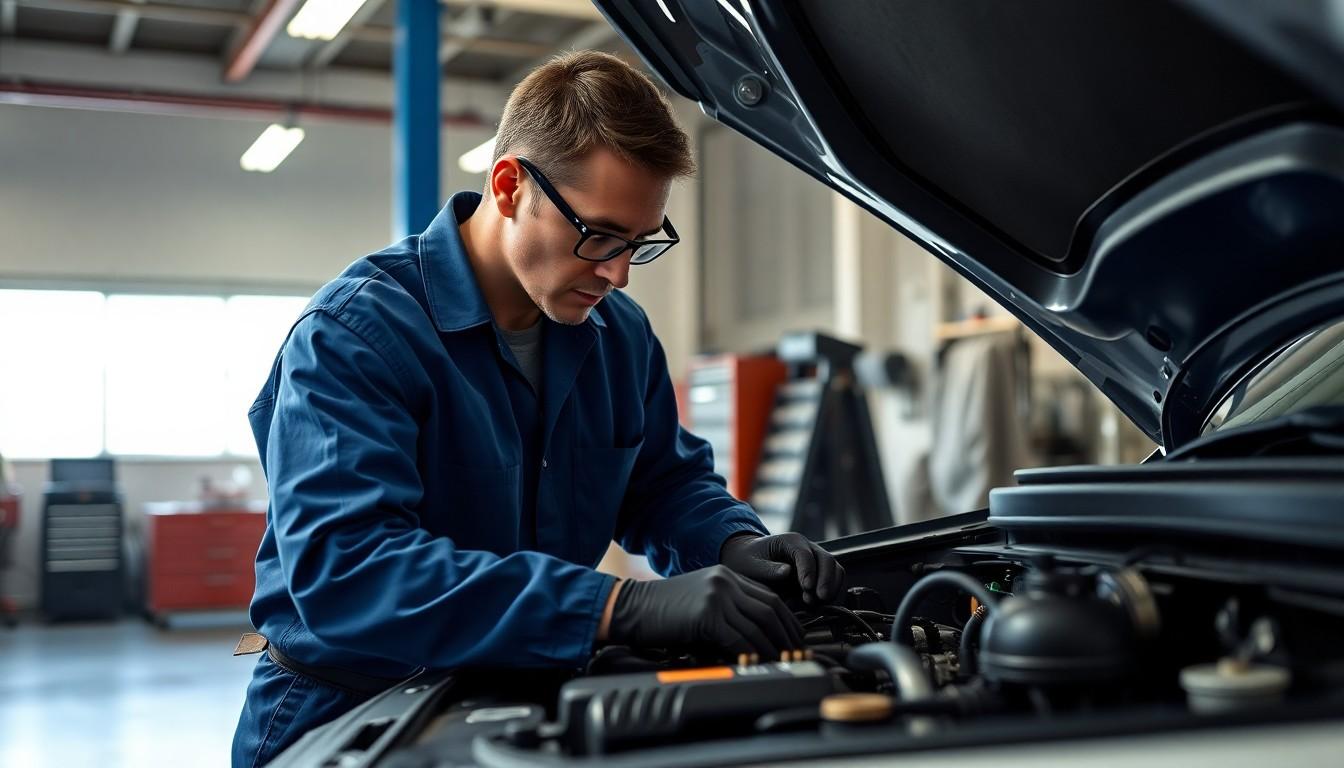
While DIY car maintenance saves money and builds valuable skills, certain repairs demand professional expertise and specialized equipment. These complex tasks involve critical vehicle systems where mistakes can lead to costly damage or safety hazards.
Engine and Transmission Repairs
Engine and transmission systems contain intricate components that require extensive technical knowledge to repair correctly. Professional mechanics possess specialized tools and diagnostic equipment necessary for accessing hard-to-reach parts within these systems. Attempting engine block repairs, transmission gear fixes, or major internal component work without proper training often results in additional damage. The complexity of modern vehicle engines, with their computerized systems and precise calibrations, makes professional intervention essential for most internal engine work beyond basic maintenance.
Timing Belt Replacements
Timing belt replacement represents one of the most critical maintenance procedures that’s best left to professionals. This crucial component synchronizes the rotation of the crankshaft and camshaft, ensuring your engine’s valves open and close at the exact right moment. Professional mechanics understand the precise timing specifications required for your exact vehicle model. Incorrect installation can lead to catastrophic engine damage if the timing is off by even a small margin. The procedure often involves removing multiple components to access the belt, making it a complex job requiring specialized knowledge and tools.
Electrical System Diagnostics
Modern vehicles contain sophisticated electrical systems with complex networks of sensors, modules, and computers. Diagnosing electrical issues requires professional-grade scanning tools that can communicate with your vehicle’s onboard computers. These advanced diagnostic devices identify problems within the system that aren’t visible through visual inspection alone. Electrical issues often present intermittent symptoms that professionals can trace systematically using their expertise and equipment. Attempting DIY electrical repairs risks damaging sensitive components or creating new problems through incorrect connections or improper testing procedures.
Advanced Brake System Work
Basic brake pad replacement might be within reach of confident DIYers, but advanced brake system repairs should remain in professional hands. Brake calipers, master cylinders, and ABS components directly impact vehicle safety and require precise installation and bleeding procedures. Professional mechanics ensure proper torque specifications on all brake components, which is critical for optimal performance and longevity. The complexity increases with vehicles equipped with electronic stability control or regenerative braking systems found in hybrid and electric vehicles. Mistakes in brake system repairs can lead to brake failure, creating dangerous driving conditions that put lives at risk.
Safety Considerations for DIY Mechanics
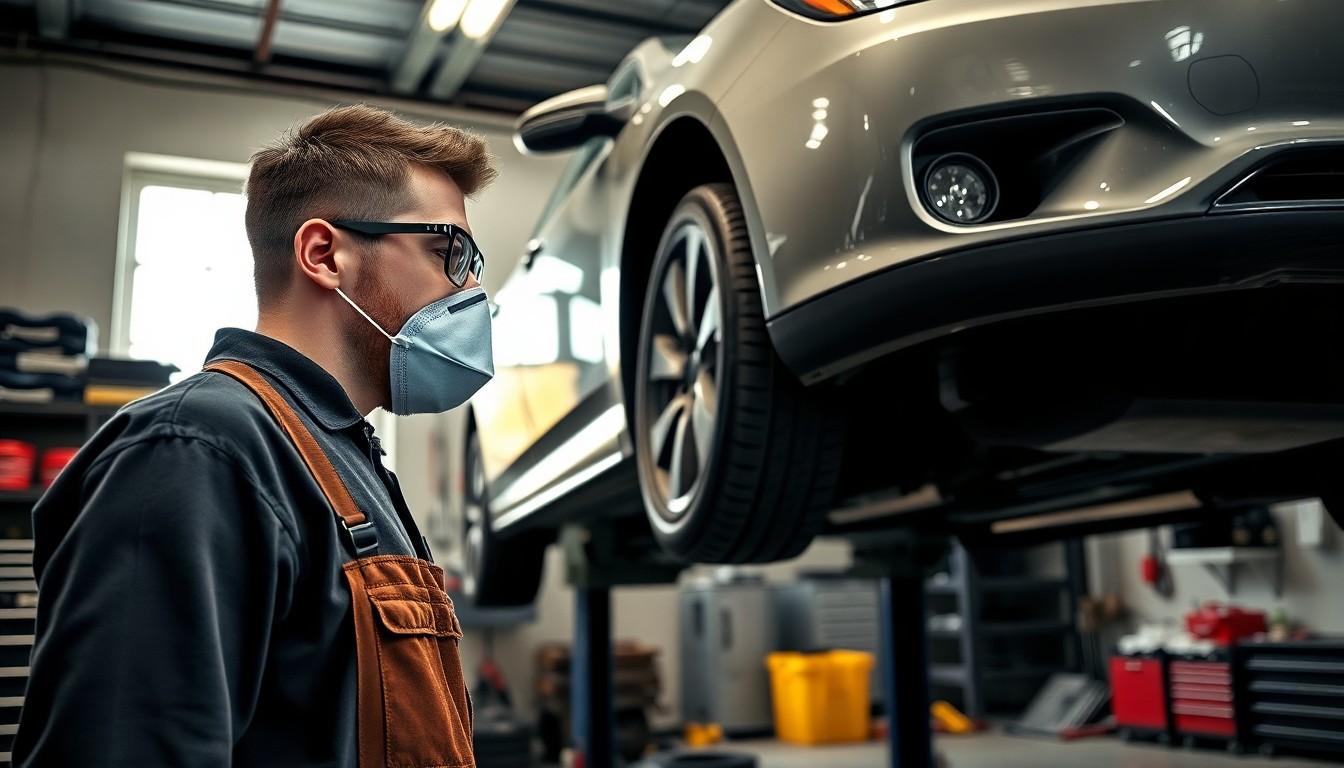
Safety Gear and Precautions
Proper safety equipment protects you from preventable injuries during DIY car maintenance. Always wear safety glasses when working with automotive fluids to shield your eyes from harmful splashes. Dust masks are essential when handling brake components or performing body work to prevent inhalation of dangerous particles. Good ventilation in your work area is non-negotiable – keep garage doors open, especially with the engine running, to eliminate the risk of carbon monoxide buildup.
Environmental Safety
Working on level ground prevents vehicles from rolling unexpectedly during maintenance tasks. Position your vehicle so the back end extends outside the garage when the engine needs to run, allowing exhaust fumes to dissipate safely. Adequate lighting in your workspace illuminates potential hazards and helps ensure precision in your work.
Vehicle Stability
Secure vehicle stability before crawling underneath for any maintenance. Engage the parking brake fully and place wheel blocks behind tires to prevent movement. Position your jack stands correctly on recommended lift points to distribute weight properly. Never rely solely on a hydraulic jack to support a vehicle while you’re working beneath it.
Buddy System
Having another person nearby during complex maintenance tasks provides crucial safety benefits. Keep a charged phone within reach for emergencies requiring roadside assistance or medical help. The buddy system is particularly important when working with heavy components or when diagnostic troubleshooting requires someone to operate controls.
By following these safety guidelines, DIY car maintenance becomes both cost-effective and secure. Taking proper precautions protects you from common workshop hazards while still allowing you to enjoy the benefits of maintaining your vehicle yourself.
Cost Analysis: DIY vs. Professional Service
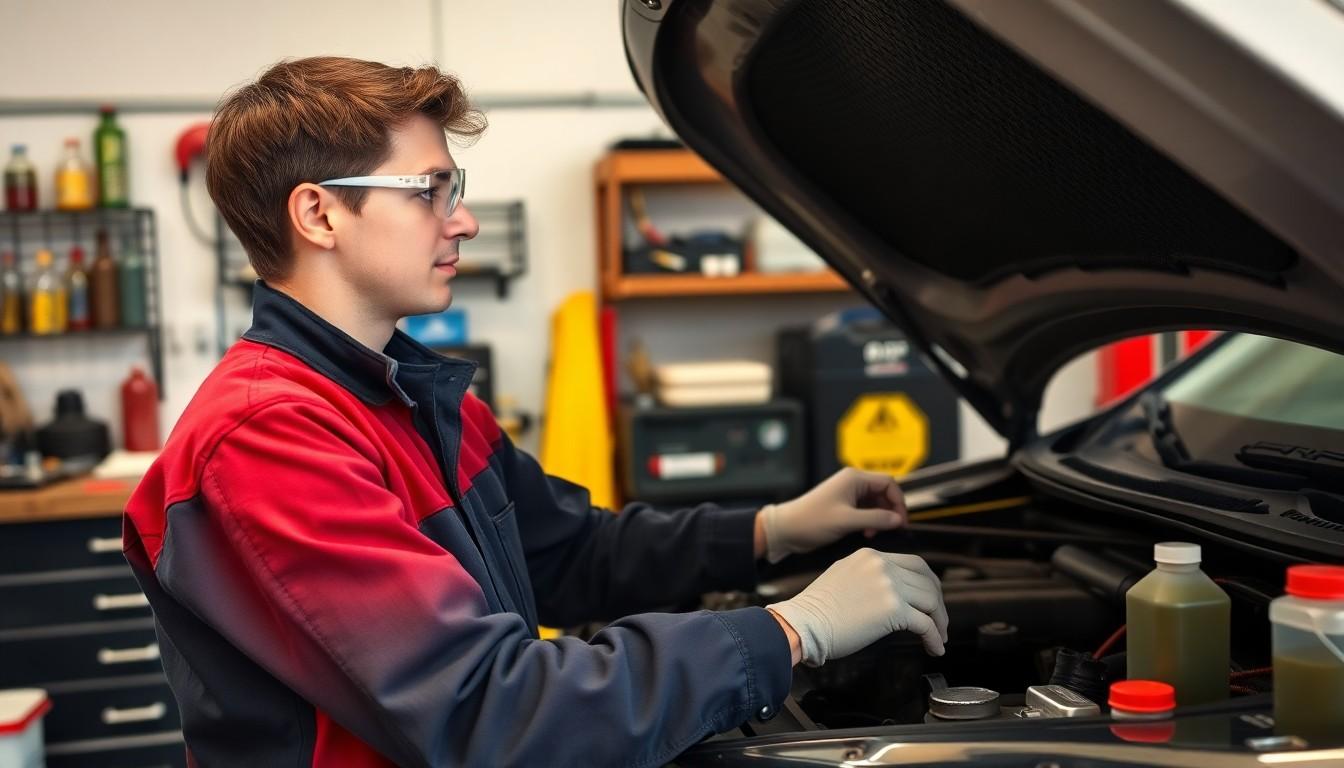
DIY car maintenance offers substantial cost savings compared to professional services. Performing simple maintenance tasks yourself eliminates labor costs that typically account for 50-70% of service bills. For example, an oil change at a service center costs $75-$150, while doing it yourself can save $45-$75 per service.
Potential Savings
Regular DIY maintenance tasks provide impressive financial benefits:
- Air filter replacement: Save $20-$50 per filter compared to shop rates
- Windshield wiper installation: Save $15-$40 on labor charges
- Headlight/taillight bulb replacement: Save $20-$50 on service fees
- Tire pressure monitoring: Free with a $10-$20 one-time gauge purchase
- Windshield washer fluid refills: Save $10-$15 per service
Annual savings from DIY maintenance typically range from $300-$600 for basic tasks alone. More ambitious DIYers who tackle intermediate tasks like brake pad replacement can save an additional $150-$300 per service.
Hidden Benefits
DIY maintenance creates value beyond direct cost savings. Regular personal inspections help identify potential problems before they become expensive repairs. A DIY approach also extends the lifespan of vehicle components through more frequent attention than scheduled professional service intervals.
When Professional Service Makes Financial Sense
Professional service becomes economically sensible for complex repairs requiring specialized tools or expertise. The cost analysis shifts when considering:
- Equipment investment: Some repairs require expensive specialized tools
- Time commitment: Complex tasks may require several hours of labor
- Risk factors: Incorrect repairs can lead to additional damage or safety issues
Professional mechanics complete oil changes for $75-$150, brake pad replacements for $150-$300, and battery replacements for $100-$200. Though these services cost more upfront, professional work typically includes warranties and guarantees that protect against future issues.
Balancing DIY and Professional Work
A balanced approach to car maintenance maximizes value. Taking on simple tasks yourself while delegating complex repairs to professionals creates optimal cost efficiency. This hybrid strategy respects both financial considerations and safety concerns while maintaining vehicle reliability.
Conclusion
Taking charge of your car maintenance offers substantial rewards. DIY tasks like oil changes filter replacements and basic checks can save hundreds annually while deepening your connection with your vehicle.
The key is knowing your limits. Embrace those accessible maintenance jobs that require minimal tools and expertise but recognize when it’s time to call the professionals for complex engine transmission or electrical system repairs.
By balancing DIY enthusiasm with prudent professional help you’ll maximize savings extend your vehicle’s life and build valuable automotive knowledge. Start small build your confidence and tool collection gradually and you’ll soon find the perfect maintenance rhythm that works for your skills budget and schedule.
Remember that proper safety precautions are non-negotiable for any DIY project. Your vehicle deserves care and so do you.
Frequently Asked Questions
What are the basic DIY car maintenance tasks anyone can do?
Basic DIY car maintenance tasks include changing oil and oil filters, replacing air filters, changing wiper blades, maintaining batteries, and replacing light bulbs. These simple tasks require minimal tools and expertise but can save you $500-$800 annually on labor costs. Most of these maintenance jobs can be completed in 30-60 minutes at your convenience and help prevent small issues from becoming major problems.
How much money can I save with DIY car maintenance?
You can save $500-$800 annually on labor costs alone by performing basic maintenance yourself. Specific tasks offer considerable savings: oil changes ($30-$70 per service), air filter replacements ($10-$30), and brake pad replacements ($150-$300). DIY maintenance eliminates labor charges, which typically account for 50-70% of professional service bills. Regular home maintenance also prevents costly repairs down the road.
What essential tools do I need for DIY car maintenance?
A basic DIY car maintenance toolkit should include socket sets, ratchets, wrenches, pliers, screwdrivers, a tire pressure gauge, oil dipstick, work light, car jack, and multimeter. For more advanced tasks, consider investing in an air compressor, impact wrench, and OBD-II scanner. Quality tools make maintenance more efficient and can be acquired gradually as you expand your DIY skills.
Which car repairs should I leave to professionals?
Leave complex repairs involving engines, transmissions, timing belts, advanced electrical systems, and critical brake components to professionals. These systems require specialized knowledge, diagnostic equipment, and tools that most home mechanics don’t possess. Mistakes in these areas can cause serious damage or compromise safety. Professional repairs are worth the investment when tasks exceed your skill level or tool capabilities.
What safety precautions should I take during DIY car maintenance?
Always wear safety glasses and gloves, and use dust masks when necessary. Ensure proper ventilation, especially when working with chemicals. Work on level ground with the parking brake engaged and wheels blocked. Disconnect the battery before working on electrical components. Consider using the buddy system for complex tasks. Never work under a vehicle supported only by a jack—always use jack stands for safety.
What are intermediate DIY car maintenance tasks?
Intermediate DIY car maintenance tasks include brake pad replacement, spark plug changes, and comprehensive fluid checks and top-ups. These tasks require more technical knowledge and specialized tools but offer greater savings compared to professional services. Brake pad replacement can save $150-$300, while spark plug changes can save $100-$250. These repairs demand careful attention to vehicle specifications and proper procedures.
How does DIY maintenance affect my vehicle’s lifespan?
Regular DIY maintenance significantly extends your vehicle’s lifespan by preventing small issues from developing into major problems. Timely oil changes, filter replacements, and fluid top-ups keep components running smoothly and reduce wear. DIY maintenance also helps you become familiar with your vehicle’s condition, allowing earlier detection of potential issues. This proactive approach to car care can add years to your vehicle’s life.
Where can I find support for DIY car maintenance?
Find support through online DIY maintenance communities, forums, and social media groups dedicated to your specific vehicle make and model. YouTube tutorials offer visual step-by-step guides for most maintenance tasks. Vehicle-specific repair manuals, both printed and digital, provide detailed instructions and specifications. Many auto parts stores also offer free diagnostic services and staff who can provide guidance on simple repairs.

